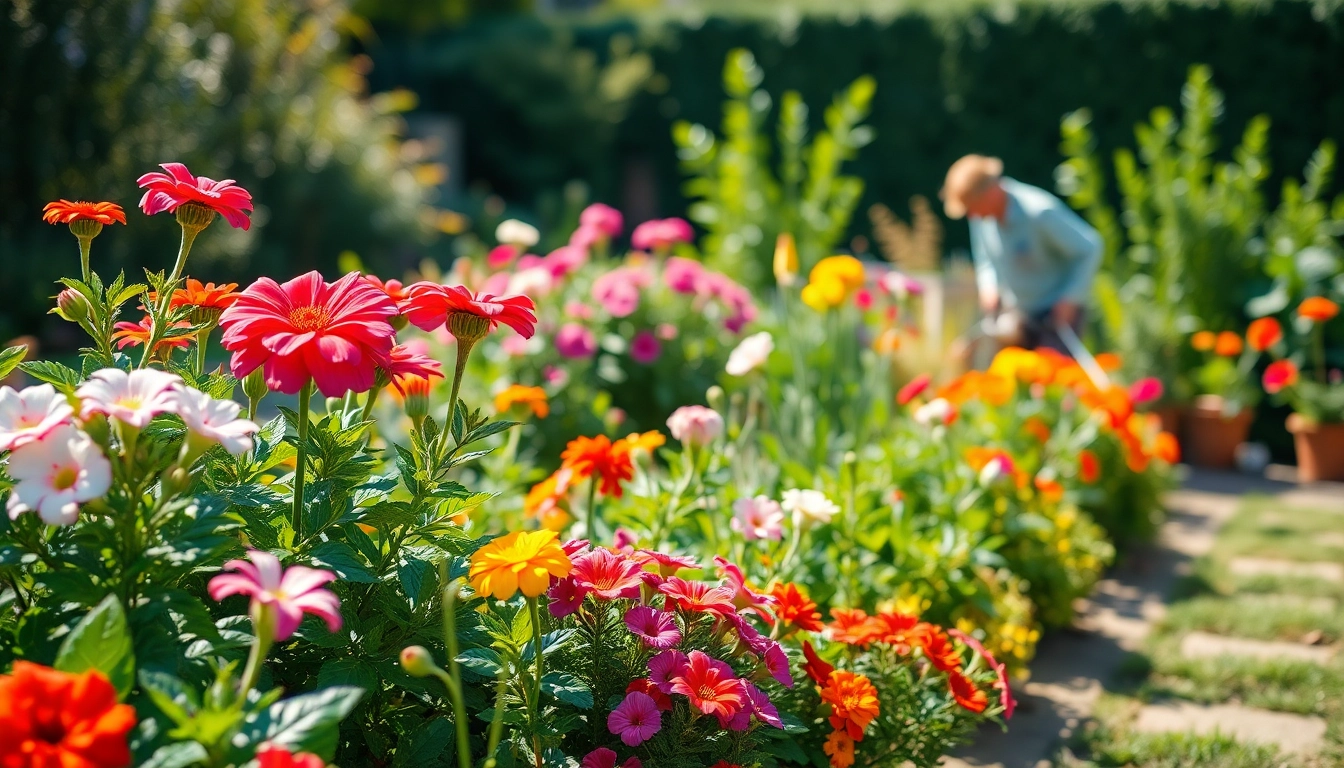
Understanding Garden Maintenance Services
What is a Garden Maintenance Service?
Garden maintenance service refers to professional care and upkeep provided to residential and commercial gardens. These services encompass a wide variety of tasks aimed at ensuring the health, aesthetics, and longevity of the garden. From routine lawn mowing to more specialized tasks like landscape design, garden maintenance services are essential for those who want their gardens to thrive without the need for hands-on work. Utilizing a garden maintenance service streamlines the upkeep process, allowing homeowners to enjoy their outdoor spaces without the stress of day-to-day responsibilities.
The Benefits of Professional Care
Engaging a professional garden maintenance service presents numerous advantages. First, it saves time. Gardeners often have demanding schedules; therefore, delegating garden care activities frees up valuable time for other pursuits. Additionally, expert care can lead to healthier plants. Professionals possess the experience, knowledge, and tools necessary for optimal plant care, ensuring that your garden remains vibrant.
Moreover, hiring an expert can enhance the aesthetic appeal of your outdoor space. A well-maintained garden increases curb appeal and can even raise property value. Lastly, employing a garden service could lead to long-term savings. By preventing issues like plant diseases, pest infestations, or landscape degradation, professional maintenance can ultimately reduce the costs associated with extensive garden repair or replacement in the future.
Identifying Your Garden’s Needs
Every garden requires unique care and attention based on various factors, including size, climate, and plant types. To determine the specific needs of your garden, begin by assessing its current health. Are there areas where plants appear weak or dead? Is the lawn patchy or yellowing? Identifying troubled spots can help specialists focus their efforts efficiently.
Furthermore, consider your garden’s goals. Are you seeking a space for relaxation, productive gardening, or vibrant landscaping? Establishing clear goals helps in selecting the right services to meet your aspirations. Regular audits of garden health and condition will help identify necessary interventions and promote a thriving outdoor environment.
Essential Services in Garden Maintenance
Lawn Care Techniques for Optimal Growth
Lawn care is a central component of most garden maintenance services. Effective lawn management involves several techniques, including mowing, aeration, fertilization, and weed control. Regular mowing encourages grass to grow thicker and healthier, while aeration combats soil compaction, allowing nutrients and water to penetrate deeper into the ground.
Overseeding and fertilization are also essential practices. Overseeding replenishes grass density, while fertilization provides necessary nutrients that promote robust growth. Finally, a proactive weed management strategy helps maintain the health of your lawn, preventing pests and diseases from taking root.
Pruning and Trimming Basics
Pruning and trimming are vital for maintaining plant health and aesthetics. Regular pruning encourages new growth and improves airflow, which reduces the risk of disease. Understanding the type of plants in your garden is crucial, as various species have different pruning requirements. Generally, it’s best to prune in late winter or early spring before new growth occurs.
Trimming, on the other hand, focuses on shaping and controlling growth. Regular trimming can make a significant difference in the structural integrity of shrubs and trees, giving them a neat appearance while promoting healthier growth.
Seasonal Clean-ups: What You Need to Know
Seasonal clean-ups are essential in preparing your garden for changing weather conditions. In spring, cleaning up dead leaves, debris, and spent plants revitalizes the garden for new growth. Fall clean-ups focus on ensuring that perennials are protected through winter, and areas are ready for winter snows. Knowing when and what to clear out is fundamental in maintaining a vibrant and healthy garden.
Choosing the Right Garden Maintenance Service
Questions to Ask Before Hiring
Choosing the right garden maintenance service requires thoughtful consideration. Start by asking potential service providers about their experience and qualifications. Inquire about their specializations—is it just lawn care, or do they also handle trees, shrubs, and plants? It’s beneficial to ask for references or to review case studies of their past work, as this can help gauge their reliability and quality of work.
Additionally, clarify what services are included in their maintenance packages. Some companies may offer a broad range of services, while others may focus solely on specific tasks. Understanding these details will help you select the service that best aligns with your garden’s specific needs.
Evaluating Service Packages
When evaluating service packages, consider not just the cost but also the level of service provided. Transparent pricing and comprehensive service details should be standard for reputable companies. Services should include regular maintenance check-ups, emergency services for garden health issues, and seasonal assessments to keep your space in top shape.
Comparing packages from different providers can also be enlightening. Look for those that offer customizable options—this allows you to tailor service according to your garden’s evolving needs and changes throughout the seasons.
Reading Customer Reviews and Testimonials
Customer reviews and testimonials are critical in selecting a garden maintenance service. Look for feedback on social media platforms, Google reviews, or the company’s website. Pay attention to the overall sentiment and specific comments regarding service quality, timeliness, and customer support.
Engaging in local gardening groups or forums can also provide insights into reputable services within your community. Word-of-mouth recommendations often reveal information that may not be apparent in formal reviews.
DIY vs. Professional Garden Maintenance
When to Hire a Professional Service
Deciding between handling garden maintenance yourself or hiring a professional can be challenging. Factors such as the size of the garden, complexity of the plants, and your gardening experience play significant roles. If you possess limited time or gardening knowledge, engaging a professional service can alleviate stress and ensure the garden is well cared for.
Moreover, larger properties with complex gardens or special landscaping should be cared for by professionals, as maintaining their health and beauty often requires specialized skills and tools that average DIY methods may not cover.
Best Practices for DIY Maintenance
For those who choose to undertake garden maintenance themselves, adhering to best practices enhances efficiency and outcomes. Research is pivotal; understanding plant types, growth patterns, and seasonal needs allows you to plan effectively. Creating a schedule can ensure regular upkeep of lawn mowing, dead-heading flowers, and general tidiness of plant beds.
It’s also advantageous to join gardening workshops or classes, which can boost your skill level significantly. Investing in quality tools tailored to your gardening tasks will improve efficiency and results.
Tools Needed for Effective Garden Care
Equipping yourself with the right tools is fundamental to successful DIY garden maintenance. Essential tools should include:
- Pruning Shears: For trimming and shaping plants.
- Lawn Mower: A reliable mower is crucial for maintaining grass health.
- Rakes and Shovels: For cleaning, planting, and moving soil.
- Hand Trowel: Ideal for planting seedlings and weeding.
- Garden Hose or Sprinkler: For efficient watering.
Having a well-maintained set of tools can simplify tasks, reduce fatigue, and improve the overall gardening experience.
Measuring Success in Garden Maintenance
Key Metrics for Garden Health
Determining the success of garden maintenance involves monitoring specific metrics. Plant health is a primary indicator—look for vibrant colors, healthy leaf growth, and a lack of pests. Furthermore, soil quality is vital; healthy soil promotes optimal growth. Regularly check pH levels and nutrient content to address any deficiencies promptly.
Lawn metrics, such as grass height and density, offer insight into lawn health. Witnessing lush, thick grass signifies effective maintenance and care.
Common Issues and How to Address Them
Even with the best maintenance practices, gardens can encounter challenges. Common issues like pest infestations and diseases can be managed via proactive strategies. Implementing natural pest control methods, such as companion planting or beneficial insects, can minimize the impact of pests without harming important garden life.
Additionally, recognizing early signs of diseases—such as wilting, discoloration, or unexpected leaf drops—can facilitate timely intervention. Always remain observant of your garden’s condition, and know when to seek expert advice.
Maintaining Long-term Garden Success
Long-term garden success stem from consistent monitoring, adjusting care based on seasonal changes, and staying educated on best practices. Regular reviews of garden plans ensure that goals are being met, and adaptations can be made as needed. Joining gardening communities or subscribing to gardening magazines can provide ongoing education, enhancing your knowledge and skills.
Finally, take time to enjoy the beauty of your garden. Regular interaction fosters a connection that can inspire self-care and diligence in maintaining a flourishing garden sanctuary.







